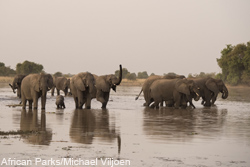
Thursday, March 3rd 2016 was World Wildlife Day. This year, with the theme of protection of elephants in particular and recognizing the links between wildlife trafficking and the perpetration of atrocities in central and eastern Africa, Enough is calling on U.S. Congress to pass critical anti-wildlife trafficking legislation – make your voice heard and take action here.
This blog was written by Enough Project intern Sophie Haggerty.
Wildlife poaching and trafficking are horrific crimes against animals, and those who work on human rights should also recognize the nexus between those crimes in their own right, corruption, and the human atrocities committed by many of the groups who profit from the illicit trade.
Increased regulation of wildlife trafficking, because of its use as a funding source for armed groups such as the Lord’s Resistance Army (LRA), the Séléka movement in Central African Republic, and Janjaweed militias in Sudan, is a critical concern for the development, security, and humanitarian situations of fragile states.
Wildlife poaching is part of a much larger system of transnational crime and illicit financial flows that robs developing countries of their resources and funds atrocities. Beyond the immediate destruction and mistreatment of wildlife populations, this trade has much further implications in funding the activities of groups that commit atrocities (like the LRA and Janjaweed groups), who are using income from valuable ivory to purchase arms and ammunition. The practice of wildlife poaching and the smuggling networks and related products, represent one of the least regulated funding sources for organized crime syndicates, armed groups, and terrorist networks.
Anti-poaching efforts are an issue with strong bipartisan support in the United States and a well-developed global community of advocates. The anti-corruption and atrocity prevention communities must join hands with conservation groups to support upcoming opportunities for change. Increased regulation surrounding wildlife trafficking would mark a positive step forward for the missions of all three civil society movements.
According to estimates in a forthcoming report on Transnational Crime and Illicit Markets to be released this summer by the group Global Financial Integrity, the illicit market for wildlife trafficking — including both animals themselves and animal products — amounts to $15-20 billion per year.
The opaque global financial system makes possible this type of trafficking and perpetuates the flow of money to groups committing human rights abuses and atrocities. The network of clandestine shell companies helps enable traffickers to sell these goods and transfer the proceeds freely without scrupulous sourcing or reporting. Efforts to stem wildlife trafficking could be limited unless the combination of solutions includes increased regulation of the illicit financial system.
Wildlife trafficking is a business that propels groups committing atrocities. Limiting the funding possibilities of these groups will go a long way to weaken them. Wildlife trafficking is also a transparency issue involving shadow systems of anonymous companies, masked beneficial ownership, and money laundering by groups propagating immense harm to vulnerable communities throughout the world.
The issue of wildlife trafficking and poaching occupies spot in a complex web of transnational illicit flows and criminal activity. Global atrocity prevention, conservation, and anti-corruption movements can join together in the effort to combat wildlife trafficking — both for the sake of biodiversity of animal treatment – and for the purpose of starving dangerous groups of funding, exposing gaps in transparency, and ending impunity for those who threaten human rights around the globe.
Take Action: Support global anti-wildlife trafficking legislation here.
Learn More: See the October 2015 Enough Project Report Tusk Wars here.
For more details about Enough’s fight to end atrocity financing and impunity, check out The Sentry.

